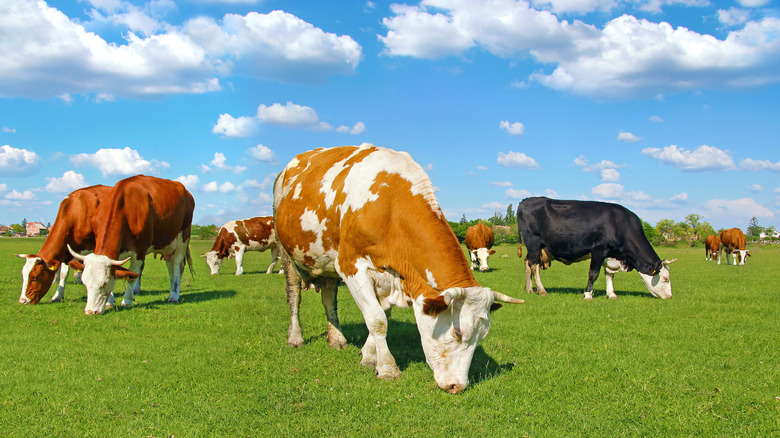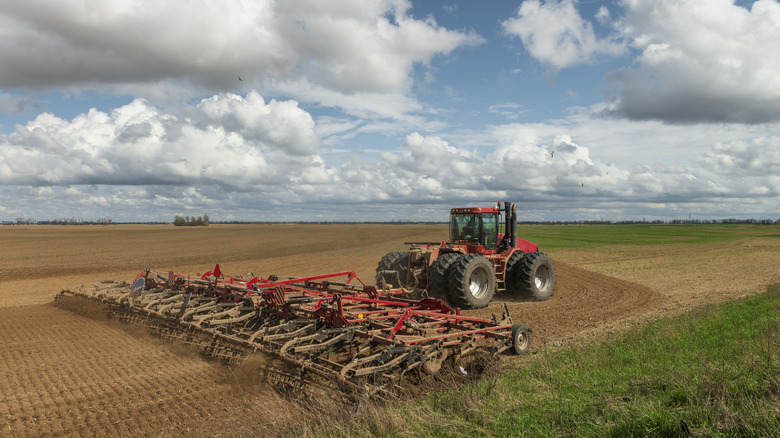What Does It Mean To Be A Regenivore?
According to PBS, naturalists like Henry David Thoreau and John Muir were among the first to introduce ideas of environmental preservation during the 1800s. The movement continued to grow and evolve over the decades as humanity's impact on the environment became all too obvious. Concerns about chemical usage, greenhouse gas emissions (from beef, for example), and pollution continue to be raised all over the globe as climate change contributes to unpredictable weather patterns and natural landscapes are devastated by corporate interests.
The environmental movement continues to thrive these days as more people put pressure on governmental agencies to alter their practices. Research conducted by Pew Research Center in 2020 shows that six out of 10 Americans believe that climate change poses a "major threat" to the nation. However, 2/3 of those polled state that the government is not doing its part to combat the issue. Despite the disappointment with how environmental matters are handled officially, individuals continue to adopt habits to support a flourishing environment, as evidenced by a new movement currently gaining ground.
One step beyond sustainable living
As explained by McGill University, environmental sustainability is defined as the careful consumption of natural resources to prevent them from being depleted. The goal of sustainability is to maintain balance within ecological systems, which assures that future generations have access to what they need to survive. While noble, sustainability is largely concerned with maintaining the environment, as opposed to taking steps to help it to thrive.
On the other hand, the regenivore movement goes beyond simply sustaining the environment to supporting its regeneration, according to Natural Grocers. In addition to environmental concerns, regenivores take a big-picture view of the landscapes where food is grown, how livestock is raised, and how the people who produce and harvest food are treated. For example, maintaining soil health ensures that crops can be reared year after year while changing the way livestock live and eat can have a significant impact on carbon emissions. The movement involves individual consumers, as well as farmers and grocery store owners, all of whom can have a significant impact on the environment and humanity. And when you consider the many threats facing planet earth, it's easy to see why regenivores are growing in number.
Why the regenivore movement is more important than ever
At the heart of the regenivore movement is a push for organic farming practices to replace current conventional systems. Rodale Institute explains that organic farming utilizes proven practices in use for centuries to yield healthy crops. It also avoids the chemical pesticides and fertilizers that wreak so much havoc on the environment, as well as potentially harming humans in the process. For instance, the use of natural composting materials can infuse the soil with the nutrients it needs without the introduction of the harmful chemicals found in fertilizer products. Accordingly, the implementation of organic practices fosters healthy soil, reduces greenhouse gas emissions, and ensures the surrounding ecosystem remains robust.
Bolstering soil quality is another important concern for regenivores, especially in light of troubling soil erosion rates. The Chippewa Herald reports on soil loss within the Midwest portion of the U.S., which is largely blamed on modern farming practices that rely on harsh chemical inputs and repeated tilling, which disturbs soil quality. Currently, soil loss is occurring 100 times faster than soil is being replenished, which will increase rates of pollution while also depriving farmers of land to grow their crops. Climate-focused agricultural practices, such as cover crops to maintain soil quality between harvests and till-less farming, are two proposed solutions that could slow the rate of soil erosion. Regenivores encourage these and other solutions to ensure humanity has a robust and prosperous environment to call home for generations to come.


